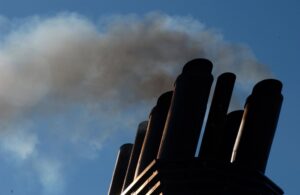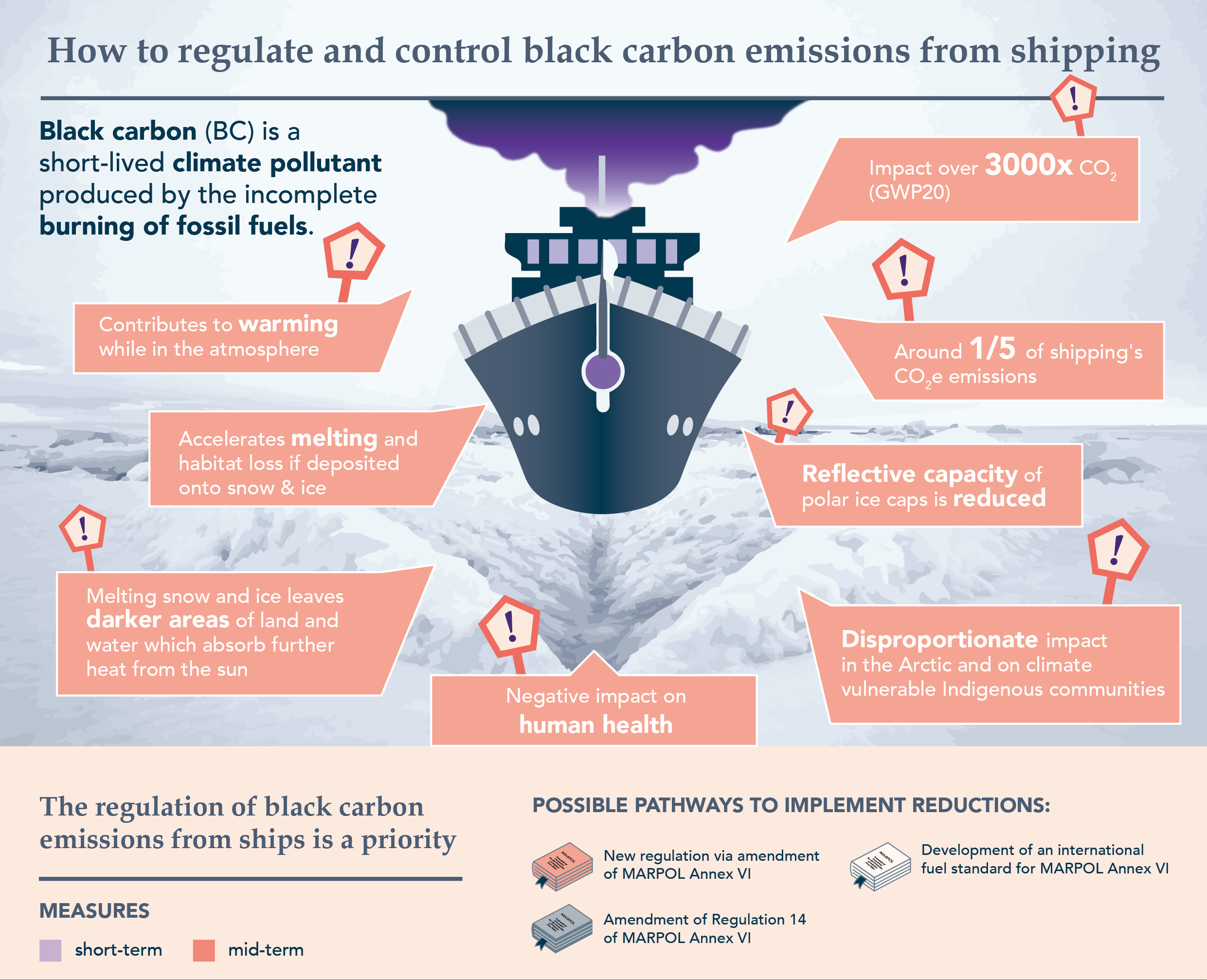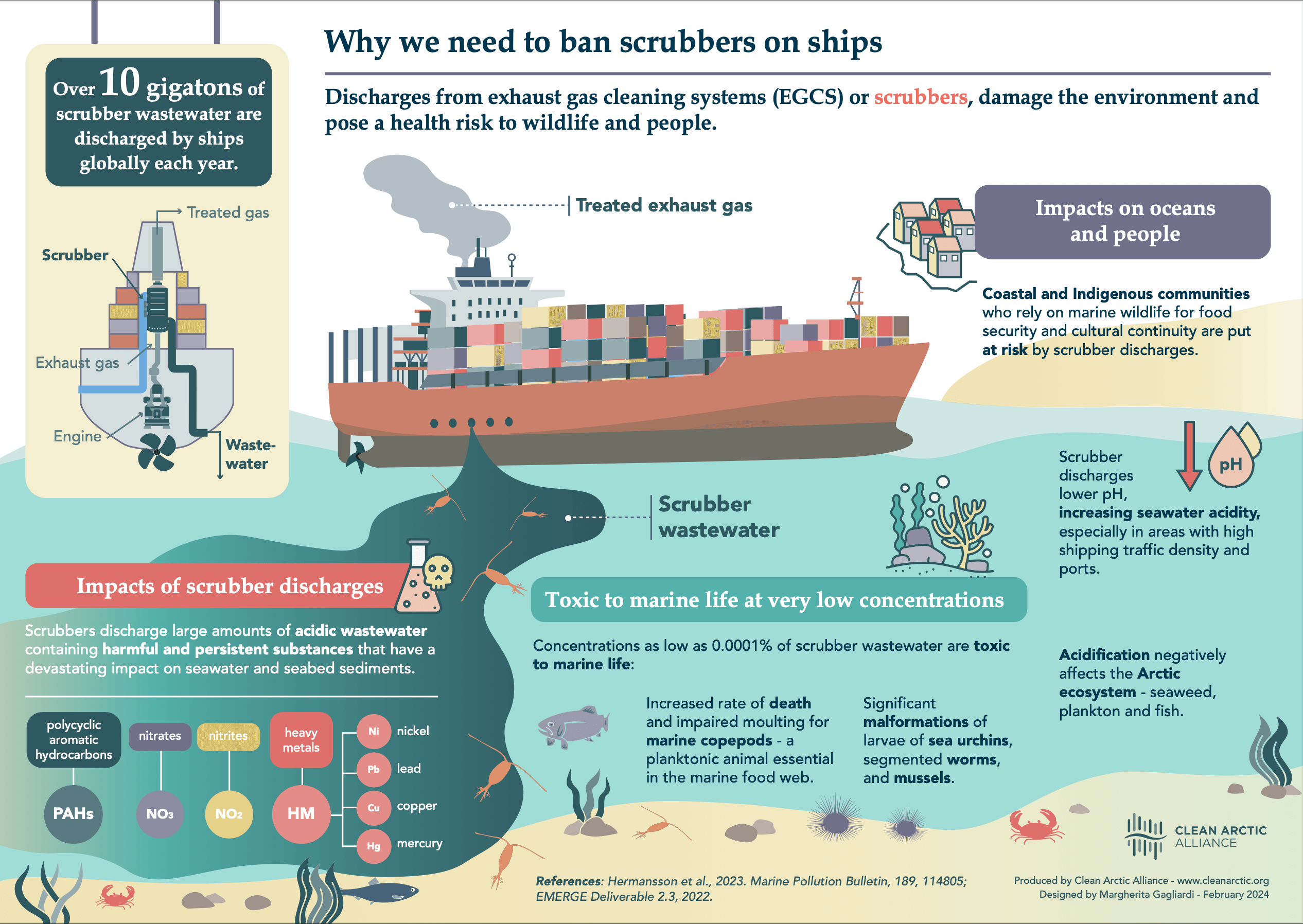
London, 26 November 2021 :- The Clean Arctic Alliance today welcomed the adoption of an International Maritime Organization (IMO) resolution to cut the climate impacts of black carbon emissions by shipping on the Arctic, but expressed disappointment in the watering down of its substance in order to reach consensus and placate a small but vocal group of opposing countries.
Proposed during this week’s Marine Environment Protection Committee (MEPC 77) by Canada, Finland, France, Germany, Iceland, Netherlands, Norway, Solomon Islands, Sweden, UK, and US, the resolution calls for support of “voluntary use of cleaner fuels by ships operating in or near the Arctic” (MEPC 77/9 [1]).
On November 25, some 27 countries (France, Sweden, Slovenia, Norway, Finland, US, Canada, Netherlands, Germany, Poland, Vanuatu, Spain, Monaco, Iceland, Italy, Croatia, Solomon Islands, Tuvalu, Belgium, Marshall Islands, Mexico, Palau, Tonga, Ireland, Fiji, Iran, Portugal) spoke in favour of paper MEPC 77/9, with more than 30 delegations backing it in total. A small group of countries spoke in opposition, including Russia, China, India, Japan, Saudi Arabia, UAE and Angola. During an informal working group to refine and finalise the resolution, the wording was systematically and meticulously watered down by opposing countries and shipping interests [2]. This version was adopted during plenary on November 26th (MEPC 77-J-9).
“While the Clean Arctic Alliance is pleased the IMO finally discussed and accepted the proposal for a black carbon resolution, which received support from over 30 delegations in plenary, including 27 IMO Member States, we are disappointed that in the effort to placate a small but vocal coterie of opposing countries, important substance was lost from the original draft resolution, leaving us with a watered down version. However, what is important is that this resolution now sends a strong message that domestic and regional action to reduce black carbon emissions from ships should proceed”, said Dr Sian Prior, Lead Advisor to the Clean Arctic Alliance.
“It was confirmed by a number of interventions from delegations during MEPC 77 that a switch to distillate, or other cleaner fuels and forms of propulsion by ships operating in and near the Arctic, will reduce black carbon emissions in the region. The Clean Arctic Alliance is confident that today’s adoption of the resolution on reducing black carbon emissions is the first step towards reducing the impact of the shipping sector on Arctic ecosystems and for Indigenous and local communities.”
“If all shipping currently using heavy fuel oils while in the Arctic were to switch to distillate fuel, there would be an immediate reduction of around 44% in black carbon emissions from these ships. If particulate filters were installed on board these vessels, black carbon emissions could be reduced by over 90%”, she added.
Black carbon is a short-lived climate forcer responsible for 20% of shipping climate impact (on a 20 year basis). When black carbon settles onto snow and ice, melting accelerates, and the loss of reflectivity creates a feedback loop exacerbating global heating. Black carbon emissions from shipping in the Arctic increased 85% between 2015 and 2019 ( more below).
Although progress was made during MEPC 77 to address emissions of black carbon from ships, the Clean Arctic Alliance noted the disappointing lack of support from IMO Members for a proposed resolution from South Pacific islands states – Kiribati, Marshall Islands and Solomon Islands – recognising the need to reach zero greenhouse gas emissions no later than 2050 (MEPC 77/7/3 [4]).
“Reducing black carbon emissions is imperative for the shipping industry in the short term, but must happen in parallel with measures to reduce greenhouse gas emissions from shipping if it is to play its part in slowing down the loss of Arctic snow and ice. It has long been recognised that what happens in the Arctic, doesn’t stay in the Arctic, and will have repercussions elsewhere through sea level rise and changing weather patterns. In light of this, the lack of support for the proposed resolution from vulnerable low-lying island states is an unacceptable response to the climate crisis.”
The Clean Arctic Alliance also welcomed progress made during MEPC 77 on the consideration of the use of scrubbers and scrubber discharges, but stressed the urgency for the work proposed to be completed during 2022 as an increasing number of scrubbers are being installed and being used each year, since the IMO’s cap on the sulphur content on fuel oil came into effect in 2020 (MEPC 77/9/1, [5]).
“Removing sulphur in exhaust emissions to then dump them into the ocean is completely unacceptable. Scrubbers and scrubber discharges should not be allowed in the Arctic or elsewhere”, said Prior.
ENDS
Contacts:
Dave Walsh, Clean Arctic Alliance Communications Advisor [email protected] +34 691 826 764
Notes:
[1] MEPC 77/9 – Submitted by Canada, Finland, France, Germany, Iceland, Netherlands, Norway, Solomon Islands, Sweden, United Kingdom and United State: Proposal to adopt an MEPC resolution to support a voluntary use of
cleaner fuels by ships operating in or near the Arctic
MEPC 77-9 – Comments on the outcome of PPR 8
[2] MEPC 77-J-9 – Draft Mepc Resolution Protecting The Arctic From Shipping Black Carbon Emissions (Secretariat)
[3] The IMO’s proposed Arctic heavy fuel oil (HFO) ban, ICCT Fact Sheet, September 2020. https://theicct.org/sites/default/files/publications/Arctic-HFO-ban-sept2020.pdf
[4] Resolution on zero emissions no later than 2050 https://imoarcticsummit.org/wp-content/uploads/2021/11/MEPC-77-7-3-Resolution-on-zero-emissions-no-later-than-2050-Kiribati-Marshall-Island….pdf
[5] MEPC 77/9/1: The urgent need to address scrubber discharges https://cleanarctic.org/2021/10/01/mepc-77-9-1-the-urgent-need-to-address-scrubber-discharges/
About the Arctic and Black Carbon
Major shifts in climate occur more strongly and proceed faster at high latitudes with the most dramatic changes seen in the sea-ice cover of the Arctic Ocean. The summer sea ice cover is much reduced compared to only a few decades ago, and the remaining ice is about half as thick. Multi-year ice has declined by around 90%. Days with no summer sea ice could come as soon as the early 2030s, if the world fails to fulfil the Paris Climate Agreement’s commitment to limit global heating to less than 1.5C, which could have unprecedented consequences for the global climate and marine environment.
Arctic shipping is increasing as reduced sea ice opens up access to resources, and interest in shorter trans-Arctic shipping routes grows. Despite global efforts, ships’ black carbon emissions are rising – black carbon emissions from shipping in the Arctic increased 85% between 2015 and 2019. When black carbon settles onto snow and ice, melting accelerates, and the loss of reflectivity creates a feedback loop exacerbating global heating. Black Carbon also has health impacts for Arctic communities. Reductions in black carbon emissions from shipping in or near the Arctic can be introduced rapidly by switching to cleaner fuels and have an immediate impact in reducing melting of snow and ice since the black carbon is short-lived and remains in the atmosphere for only days or weeks.
For more information, see the follow infographics:
How Black Carbon Emissions from Shipping Impact The Arctic
https://cleanarctic.org/2021/03/08/black-carbon-facts/
Infographic: Urgent and immediate action needed to cut black carbon emissions from ships
Video: https://www.youtube.com/watch?v=soLKYlOm-pg
About the Clean Arctic Alliance
Made up of 21 not-for-profit organisations, the Clean Arctic Alliance campaigns to persuade governments to take action to protect the Arctic, its wildlife and its people.
Members include: 90 North Unit, The Altai Project, Alaska Wilderness League, Bellona, Clean Air Task Force, Green Transition Denmark, Ecology and Development Foundation ECODES, Environmental Investigation Agency, Friends of the Earth US, Global Choices, Greenpeace, Iceland Nature Conservation Association, International Cryosphere Climate Initiative, Nature And Biodiversity Conservation Union, Ocean Conservancy, Pacific Environment, Seas At Risk, Surfrider Foundation Europe, Stand.Earth, Transport & Environment and WWF.
More more information visit https://www.cleanarctic.org/
Twitter: https://twitter.com/CleanArctic



